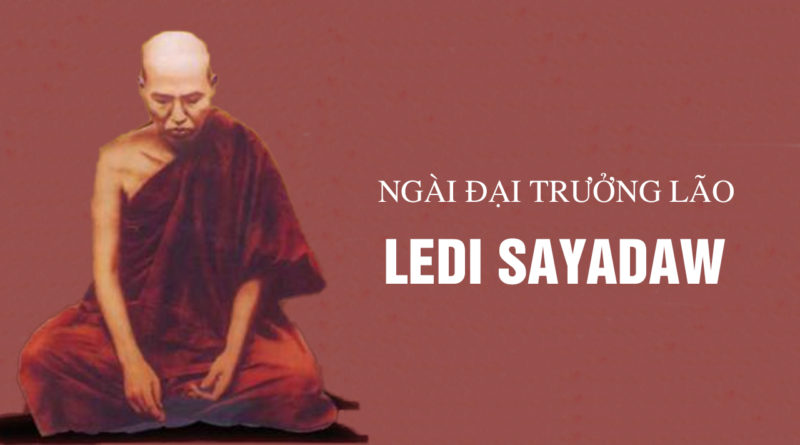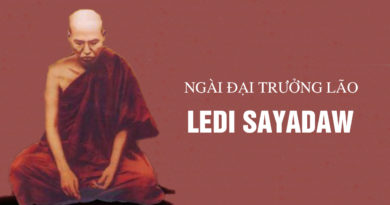A Manual Of The Dhamma – Criticising In General Terms – Ledi Sayadaw
Criticising in General Terms
To criticise in general terms, without reference to anyone in particular, is exposing of faults. One must attack or criticise unwholesome states only, such as greed, hatred, or delusion. In this correct way of criticism the four right efforts should be cultivated.
- The effort to prevent unarisen unwholesome states.
- The effort to eradicate arisen unwholesome states.
- The effort to arouse unarisen wholesome states.
- The effort to develop arisen wholesome states.
Unwholesome states that may arise in oneself in the future are called “unarisen unwholesome states.” Future evil that may be committed by oneself must be prevented with one’s own moral effort. Evil deeds one has already done are “arisen unwholesome states.” Among the ten unwholesome deeds, killing is mentioned, but this relates to killing of sentient beings generally. The discourses of the Buddha specifically mention five heinous acts (pañcānantariya kamma), such as killing one’s own father or mother, which are the gravest evils with immediate consequences.
In this infinite round of rebirth, existences in which an ordinary person knows the true Dhamma are very few. One must undergo many lives in which ignorance and delusion predominate. The lives in which an ordinary person holds wrong views are innumerable. So the evil act of killing can be done many times even within a single lifetime, let alone the number of such acts in countless previous lives. If a person commits one heinous unwholesome deed in the present life, it will give definite results in hell. The misdeeds done in countless past lives will then give their results too.
In this present life, too, many persons have committed acts of killing several times while young, which will be clear to each individual. Others have done past misdeeds of killing though they refrain from killing in this present life. Most people have done evil deeds such as killing in both the past and present lives.
Personality view opens the way to commit evils of the gravest kind, such as killing one’s father or mother, or harming the Buddha. If one still believes in a soul, and entertains doubts about the Three Gems, in future existences one might kill one’s mother or father, getting the gravest evil and the worst result. So besides killing living beings, there may be heinous misdeeds too. If a detailed analysis is made of one’s own various misdeeds, one cannot safely declare that there is a cessation of the act of killing, in the matter of ordinary or extraordinary types. If a person does not kill any sentient being today, he may commit this evil tomorrow, next month, next year, or next life. So please ponder like this: “Due to wrong view and doubt I could certainly kill my mother or father, cause schism in the Saṅgha, harm the Buddha, or kill Arahants.”
This is, of course, the “unarisen evil” mentioned above. Future evil deeds and past or present evil deeds are classified as “unarisen evil” and “arisen evil” respectively.
Why does a person perpetrate these various types of evil, pertaining to the past, present, and future? It is due to the existence of personality view. With this wrong view one will certainly do small and great evil. What is personality view? It is the belief that one’s own five aggregates are a soul, a person, a self, or an entity. This sense of “I” gives rise to the worst kammas. Both arisen and unarisen unwholesome kammas will not lose their power if personality view still exists. They are bound to increase due to wrong understanding of the nature of the five aggregates. So if circumstances are favourable, one will commit various crimes, great or small, propelled by wrong view. When personality view is eradicated, all past evil deeds and their potential results are destroyed totally. Countless evil actions cease. The ten evil deeds and the five heinous crimes are based on personality view. Personality view is their leader. Evil deeds are its followers, and its consequences.
Can one entertain any hope of cessation of evils or deliverance? If one encounters the Buddha’s dispensation in this life and practises insight meditation, one is delivered from personality view, root and branch. All past evils are wiped away, and countless effects of past evil that were due to mature also cease. Total eradication of evil is possible in this dispensation only because correct methods have been given. Human beings possess the rarest chance to overcome this appalling predicament. During this dispensation, good and rare chances are available for the destruction of countless new evils that are bound to arise in the future. All latent evils are uprooted by mindfulness as taught by the Buddha. If these methods and rare opportunities exist, it is called the Buddha’s dispensation. The dispensation is said to disappear when such opportunities no longer exist. Everyone should note that if death occurs today and life continues in an existence where these opportunities don’t exist, the dispensation disappears today. In this case the opportunities of this dispensation are lost as soon as one dies.
This rare opportunity and grave danger should be appreciated by everyone. Moral dread, together with farsighted trepidation (saṃvega), must be cultivated while one is alive and the dispensation still prevails. One must practise concentration and insight daily with great urgency. To get rid of personality view and doubt is the noblest aim in life according to the teaching of the Buddha. Morality and insight practice are essential to eradicate mental defilements and evil deeds. When one practises morality and insight meditation, mental purity and skilful deeds arise. By these means one obtains the four great moral efforts. Wholesome deeds, both arisen and unarisen, must be done in this present life.




